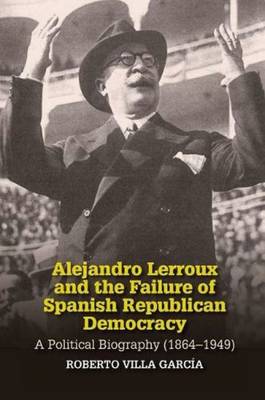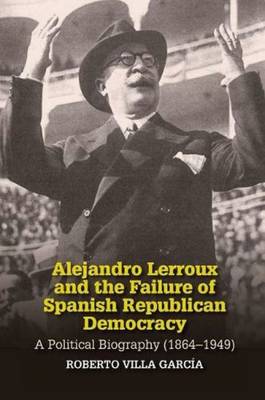
- Retrait gratuit dans votre magasin Club
- 7.000.000 titres dans notre catalogue
- Payer en toute sécurité
- Toujours un magasin près de chez vous
- Retrait gratuit dans votre magasin Club
- 7.000.0000 titres dans notre catalogue
- Payer en toute sécurité
- Toujours un magasin près de chez vous
Alejandro Lerroux and the Failure of Spanish Republican Democracy
A Political Biography (1864-1949)
Roberto Villa Garcia
132,95 €
+ 265 points
Format
Description
Alejandro Lerroux (18641949) was one of the most polemical figures of early twentieth century Spanish politics. As leader of the Radical Republican Party and six-time prime minister between 1933 and 1935, his admirers saw him as a patriot determined to create a Republic for all citizens, while his critics denounced him as an opportunistic demagogue willing to sacrifice the Republic to its enemies. Like his French republican contemporary Georges Clemenceau, Lerrouxs long political journey took him from the fiery radical leftism of his youth to centrist consensual politics. Thus while Lerroux was the most significant advocate of a revolutionary break with Spains monarchical and authoritarian past before 1931, after the proclamation of the Second Republic he wished to build an inclusive and tolerant democracy. This book is the first scholarly biography in any language of this titan of modern Spanish politics. Nigel Townsons The Crisis of Democracy in Spain (2000) is the only book in English to discuss Lerrouxs career in any detail, but his study is restricted to the Second Republic. Utilising neglected primary material, Villa Garcia argues that Lerroux embodies the transition from the elitist liberal politics of the nineteenth century to the modern mass politics of the twentieth. Like the Second Republic itself, Lerrouxs political career ended in failure. The work is a timely reminder to students of modern Spain that the demise of Republican democracy was not inevitable. Nevertheless, after the abrupt end to Lerrouxs effort to sustain a broadly based moderate and democratic government, Spain would never again achieve stable and constitutional rule until 1977. The political defeat of Lerroux was a major turning point in the countrys history, a fateful step in the failure of democracy and the coming of civil war.
Spécifications
Parties prenantes
- Auteur(s) :
- Editeur:
Contenu
- Nombre de pages :
- 264
- Langue:
- Anglais
- Collection :
Caractéristiques
- EAN:
- 9781789760484
- Date de parution :
- 02-11-20
- Format:
- Livre relié
- Format numérique:
- Genaaid
- Dimensions :
- 152 mm x 231 mm
- Poids :
- 439 g

Les avis
Nous publions uniquement les avis qui respectent les conditions requises. Consultez nos conditions pour les avis.






